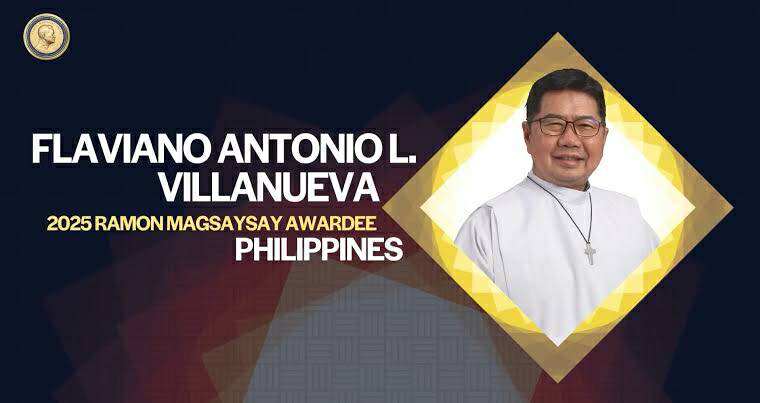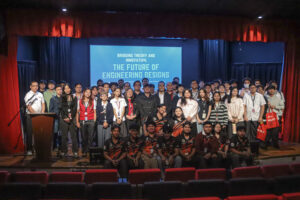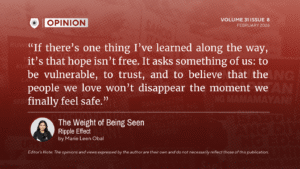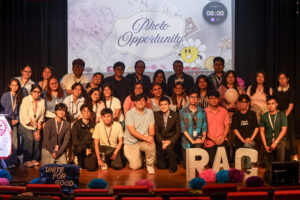Written by Angela Marie B. De Leon | September 8, 2025

Photo Courtesy of Ramon Magsaysay Awards Facebook Page
Greater Than Odds: A Chance to Change
FOR someone who once drowned in a vicious cycle of addiction and felt that no one else could lift him, the desire to change for the better was enticing. But for Fr. Flaviano Antonio ‘Flavie’ Villanueva, his journey to change did not just stop with himself, but he relentlessly continued with a goal in mind—to care and help the poor and the marginalized to renew their dignity, while also reintegrating them again into society.
This year, the Ramon Magsaysay Award, also known as the Nobel Prize of Asia, celebrates its 67th year. The award is bestowed on individuals or organizations who selflessly and effectively address worldly societal problems. This year, one of the three awardees is Fr. Flavie, who was greatly recognized for his programs of dignified care and services for the poor and the marginalized, making him the 14th Catholic Priest to receive the same Asia’s premier prize and highest honor.
He may be one of the awardees of the 67th Ramon Magsaysay Award, but behind this recognition was a man who once stood in need but is now standing with and for the disadvantaged.
A Father in Action
Fr. Flavie’s story did not start in grandeur but rather on a rough road that he willingly walked through. Back when Fr. Flavie was still in the corporate industry, he was a dependent drug user. He once asked himself, “Is this how I wish my life to be?” Life was hard and he knew something had to change. Believing it to be God's calling with a sacred purpose, he decided to join the seminary in 1998, a mission that he never thought he would do. In 2006, he was finally ordained in the Society of the Divine Word, the largest Catholic missionary congregation, founded by Saint Arnold Janssen.
With the drive to stand for the poor and the oppressed, he founded the Arnold Janssen Kalinga Center in 2015. After a year, the PagHilom program was also established.

Photo Courtesy of The Roman Catholic Archdiocese of Manila
In the Kalinga Program, the word “KALINGA” is an acronym that stands for the programs offered by the center, respectively: Kain-Aral-LIgo-naNG-umAyos (Eat, Learn, Bathe, to be Well). The program’s mission is to provide a home for the homeless and the poor, where, while providing basic necessities, leading to dignity being holistically restored holistically. The program has three phases: food and hygiene, education, and livelihood. In the first phase, there are 7 stations where an individual is welcomed, profiled, clothed, bathed, groomed, fed and sent off in a mission they called, ‘Kinalinga ka, mangalinga ka rin sa iba ng may galak’. In this last station, individuals are fully reintegrated to society with a mission to make a positive impact in their communities. For the second phase, the Alternative Learning System (ALS) is offered to give everyone the chance to receive education. Finally, the last phase is where one is offered an opportunity for livelihood and employment.
For the PagHilom program, it almost has the same approach however, its mission is to help restore the broken dignity and peace of the survivors of extrajudicial killing (EJK) victims. Some notable phases in the program are the provision of grief counseling, legal assistance, and the phase they called “Project Arise.” The project helps the remains of EJK victims’ to not be in danger of being astray because of expiring leases on public cemeteries.
Faith to Change
Fr. Flavie’s mission did not just stop with providing for the poor and the oppressed, he was also a notable critic against the War on Drugs during the Duterte Administration. Other than accommodating the EJK victims, he also helps them in getting the justice they deserve through being their voice during the proceedings.
In our society, the norm is that an ex-drug addict is commonly condemned as one who will always return and rely on substance use or what they call, addiction relapse, and the possibility to change is beyond imagination. But Fr. Flavie believed that there is always a space for one to make a difference. He reiterated that killing is never the solution, but healing is.

Photo Courtesy of Raffy Lerma, verafiles.org
Just like Fr. Flavie’s struggle, his faith helped him heal. For believers, he shared that it begins when one proclaims the mystery of faith and embraces suffering and death. “The faith tells us that rising from the dead is real, overcoming suffering is real, conquering addiction is possible, and your life is a daily choice that one has to live, your life means today I will sober, later I will be sober, when I am triggered, I will choose to be sober. And grace accompanies this choice,” said Fr. Flavie.
For non-believers, he mentioned something that one calls ‘becoming better.’ He believes that for one to get out of a web of addiction, he must remind himself of his value. “May halaga ako at ang nakaraan ko ay katiting lang ng aking kasalukuyan at bukas.”
The weight of the Ramon Magsaysay Award
Fr. Flavie exclaimed that the society’s ills are mainly because of the global pandemic of apathy. He holds that the people’s lack of interest or care for one another is one cause of homelessness. It is not only physical homelessness but also the space and feeling of being unwanted. Truth enough, the contagion of apathy will be the pitfall of the world to an endless cycle of poverty.
He sees the award as a great humbling honor for his work to be recognized and also a greater responsibility to continue his mission, “to reach and reach for higher, higher grounds, only for the purpose of recreating and re-empowering the lives of those that we served.”
To change for the better has no deadline. Anyone can change for the better, in their own will, and phase. For an individual, change may start with oneself. But for everyone, change starts by aring for others.
Volume 31 | Issue 3



